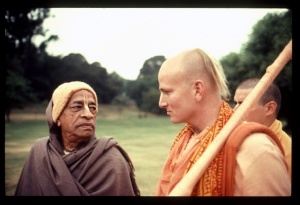SB 12.3.21: Difference between revisions
No edit summary |
(Vanibot #0054 edit - transform synonyms into clickable links, which search similar occurrences) |
||
| Line 23: | Line 23: | ||
<div class="synonyms"> | <div class="synonyms"> | ||
''[//vanipedia.org/wiki/Special:VaniSearch?s=tadā&tab=syno_o&ds=1 tadā]'' — then (in the Tretā age); ''[//vanipedia.org/wiki/Special:VaniSearch?s=kriyā&tab=syno_o&ds=1 kriyā]'' — to ritualistic ceremonies; ''[//vanipedia.org/wiki/Special:VaniSearch?s=tapaḥ&tab=syno_o&ds=1 tapaḥ]'' — and to penances; ''[//vanipedia.org/wiki/Special:VaniSearch?s=niṣṭhāḥ&tab=syno_o&ds=1 niṣṭhāḥ]'' — devoted; ''[//vanipedia.org/wiki/Special:VaniSearch?s=na&tab=syno_o&ds=1 na] [//vanipedia.org/wiki/Special:VaniSearch?s=ati&tab=syno_o&ds=1 ati]-[//vanipedia.org/wiki/Special:VaniSearch?s=hiṁsrāḥ&tab=syno_o&ds=1 hiṁsrāḥ]'' — not excessively violent; ''[//vanipedia.org/wiki/Special:VaniSearch?s=na&tab=syno_o&ds=1 na] [//vanipedia.org/wiki/Special:VaniSearch?s=lampaṭāḥ&tab=syno_o&ds=1 lampaṭāḥ]'' — not wantonly desiring sense gratification; ''[//vanipedia.org/wiki/Special:VaniSearch?s=trai&tab=syno_o&ds=1 trai]-[//vanipedia.org/wiki/Special:VaniSearch?s=vargikāḥ&tab=syno_o&ds=1 vargikāḥ]'' — interested in the three principles of religiosity, economic development and sense gratification; ''[//vanipedia.org/wiki/Special:VaniSearch?s=trayī&tab=syno_o&ds=1 trayī]'' — by the three ''Vedas''; ''[//vanipedia.org/wiki/Special:VaniSearch?s=vṛddhāḥ&tab=syno_o&ds=1 vṛddhāḥ]'' — made prosperous; ''[//vanipedia.org/wiki/Special:VaniSearch?s=varṇāḥ&tab=syno_o&ds=1 varṇāḥ]'' — the four classes of society; ''[//vanipedia.org/wiki/Special:VaniSearch?s=brahma&tab=syno_o&ds=1 brahma]-[//vanipedia.org/wiki/Special:VaniSearch?s=uttarāḥ&tab=syno_o&ds=1 uttarāḥ]'' — mostly ''brāhmaṇas''; ''[//vanipedia.org/wiki/Special:VaniSearch?s=nṛpa&tab=syno_o&ds=1 nṛpa]'' — O King. | |||
</div> | </div> | ||
Latest revision as of 21:03, 17 February 2024

A.C. Bhaktivedanta Swami Prabhupada
Please note: The synonyms, translation and purport of this verse were composed by disciples of Śrīla Prabhupāda
TEXT 21
- tadā kriyā-tapo-niṣṭhā
- nāti-hiṁsrā na lampaṭāḥ
- trai-vargikās trayī-vṛddhā
- varṇā brahmottarā nṛpa
SYNONYMS
tadā — then (in the Tretā age); kriyā — to ritualistic ceremonies; tapaḥ — and to penances; niṣṭhāḥ — devoted; na ati-hiṁsrāḥ — not excessively violent; na lampaṭāḥ — not wantonly desiring sense gratification; trai-vargikāḥ — interested in the three principles of religiosity, economic development and sense gratification; trayī — by the three Vedas; vṛddhāḥ — made prosperous; varṇāḥ — the four classes of society; brahma-uttarāḥ — mostly brāhmaṇas; nṛpa — O King.
Translation and purport composed by disciples of Śrīla Prabhupāda
TRANSLATION
In the Tretā age people are devoted to ritual performances and severe austerities. They are not excessively violent or very lusty after sensual pleasure. Their interest lies primarily in religiosity, economic development and regulated sense gratification, and they achieve prosperity by following the prescriptions of the three Vedas. Although in this age society evolves into four separate classes, O King, most people are brāhmaṇas.